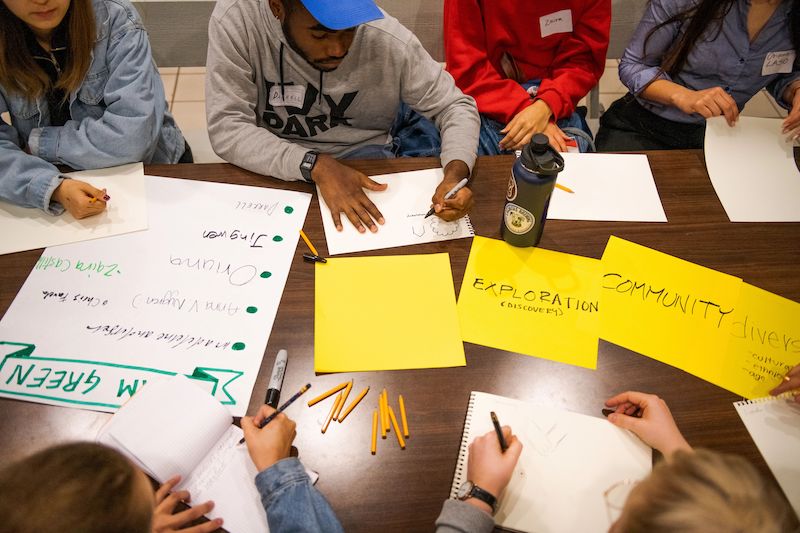UTO 2.1 Culture Check-In: Cultivating the positive core

Teams and contributors across UTO were invited to submit for the latest Culture Check-in this past spring as a way to reflect on the organizational culture in light of UTO 2.1. Among thepriorities and goals outlined in this new model was a conscious focus on stakeholder voice and a “rapidly reconfigurable and entrepreneurial organizational structure that prioritizes and executes projects to better meet the needs of our community,” as shared by Lev Gonick, Chief Innovation Officer.
Hear an overview of the survey results from Christine Whitney Sanchez, Chief Culture Officer, and Elizabeth Reilley, Director of Data Solutions, hosted by Sophie Jones. Hit play and then follow along below for additional insights.
Dive into a deeper analysis of the survey
Along with Whitney Sanchez and Reilley, designers of the survey included Mike Sharkey, Director of Data and Analysis and Victoria Poshkoff, part of the Data Analysis team, who collaborated with members of Culture Weavers, a UTO community of practice with the “intent to weave an organizational culture at UTO for Digital Transformation and Customer Delight.”
The April 2021 culture survey was the fourth in a series of check-ins that started in February 2019. The surveys focus on aspects of the Positive Core which encapsulate the mission and aspirations -- belonging, relations, authentic, visionary and empowered -- as well as collaboration, agility, engagement, leadership and timely topics. Over 330 people, or 57% of the UTO workforce, responded to the recent survey.
Positive Core
Overall, UTO employees feel that the Positive Core guides their work, with almost three-quarters stating it shapes both their individual and team approach. Despite having gone through pandemic and major reorganization, “we still see relatively high results which says a lot about the resiliency of the people and UTO,” Reilley explained when sharing the results with the Culture Weavers.

Survey responses also indicated that UTO consistently rates high in “relational,” with one respondent stating a need to “reduce workloads to create more space [and] time for cultivating the relationships and behaviors that are so key to our collective success.” Others cited a desire for “more cross-functional partnerships and opportunities” as well as “having a voice on different levels and platforms.” UTO employees also feel more empowered and trusted since the launch of 2.1, yet “that does not mean I have the time to enjoy learning opportunities” while others “hope the autonomy continues and isn't short lived.”
Engagement
Engagement, defined as “the strength of the mental and emotional connection employees feel toward the work they do, their teams, and their organization,” was one of the lowest ranked among the survey variables. Concerns about workload and no time for participating in guilds and activities were cited frequently. Events such as Empower and Engage provide opportunities “to unite UTO and/or the ASU tech community to periodically reset and realign;” however, others wish for “more virtual small group activities…where we are able to do cross-functional brainstorming and problem-solving with new people who we might not have had a chance to work with yet.”
Leadership
Although respondents mentioned that there was not a lot of time to engage in activities outside of their regular work, they did applaud Chapter Leads for their encouraging participation in seminars, workshops and other events for professional development. The transition to Chapter Leads in the reorganization of UTO 2.1 seems to have fostered this growth, with an 11% increase over the last year in people who believe that leadership actively encourages them to grow professionally and network outside their team.
UTO Senior Leadership is also seen as having strong values for the individuals within the organization, with 89% of respondents stating that they feel respected regardless of any perceived differences. Communication with individuals and relaying the team’s purpose present growth opportunities.

A look towards the future
UTO 2.1 has been the North Star through the pandemic, yet there is still work to be done across the organization. At the time of the survey, about half of respondents indicated a preference to return to campus or a hybrid modality while the other half preferred to remain remote. As we prepare for a return to campus, the strategic priorities and goals of UTO 2.1, underscored by the ASU Charter, will guide the transition and forward movement of the organization.

To engage in UTO’s Conscious Collaborative Culture and shape the future of 2.1, join Culture Weavers and ASU’s Culture Ripples community of practice.